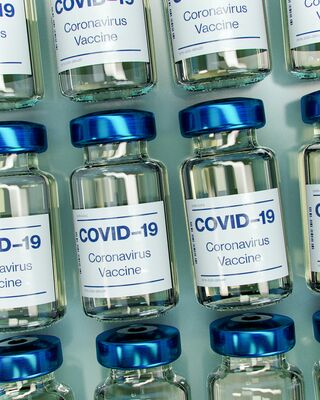Intuition
Unpacking the “Fast Development = Risky Vaccine” Intuition
Lay theories influence behavior and are notoriously difficult to change.
Posted December 21, 2020 Reviewed by Lybi Ma
“They may have cut corners. There may be side effects. The vaccine is scarier than the virus itself.” —Federico Sarti, 33-year-old Italian travel agent
As we move through the first weeks of the COVID-19 vaccine rollout, the vaccine hesitancy challenge simmers below the surface. Surveys conducted over the past several months have consistently found that anywhere from one-third to one-half of all Americans are unlikely to take a vaccine even if it is free and widely available. The proportions of vaccine-hesitant citizens in other countries, like France, Germany, and Japan, are similarly high.

The reason given most often by vaccine-hesitant Americans is that its development has been too fast. More vaccine-resistant Americans are concerned about the implications of fast vaccine development than about its side effects or its effectiveness. They believe that the COVID-19 vaccine has been approved for use without adequate testing or understanding of its long-term effects and is therefore risky.
In this post, I want to explore the “Fast Development = Risky Vaccine” intuition. Such intuitions, also known as lay beliefs or lay theories, are common forms of consumer understanding. When deciding what to eat, for example, we believe that an unhealthy food item will be tasty, healthy food will be less filling and more expensive, comfort food will reduce stress, etc. Consumer psychologists have studied how lay theories are formed, how people use them in making decisions, and how they can be changed. This research helps us to understand just how much of a challenge the “Fast Development = Risky Vaccine” intuition poses to the smooth adoption of the COVID-19 vaccine across the world.
Origins of the “Fast Development = Risky Vaccine” Intuition
Lay theories are a type of practical knowledge that we use to navigate our day-to-day lives more efficiently. We form intuitions about how things work and how they will affect us using our observation, common sense, and available information to reinforce or modify our theories. When there are blanks in available information, we fill them in by using our perceptions and logic as best as we can.
If a trustworthy source says, “The creation of a vaccine usually requires 10 to 15 years of research before the vaccine is made available to the general public,” this factual information establishes a reasonable timeline for what we expect will happen. Relative to this baseline, when we later learn that the COVID-19 vaccine is being developed and ready for public use in less than a year, we will naturally form questions in our minds, such as, “Did the COVID-19 vaccine developers skip some steps?” “What if there are long-term effects they haven’t discovered yet?” and “Will it be safe to take this vaccine?” Questions like these form the crux of the “Fast Development = Risky Vaccine” intuition and become a cause for vaccine hesitancy.
Ever since the early days of the pandemic in March 2020, governmental agencies and politicians have constantly said that they’re pushing for the vaccine’s fast development. The U.S. government’s vaccine development program is called Operation Warp Speed. Its goal has a hard deadline (January 2021), and it seeks “to accelerate the development, manufacturing and distribution” of the vaccines. Because the pursuit of speed has been consistently expressed by politicians and scientific experts month after month, Americans haven’t had to stretch to grasp the “fast development” piece of the intuition.
During the early months of the pandemic, Americans also heard cautionary statements from many virologists, immunologists, and other vaccine experts (sources of the quotes are linked):
- “No vaccine against a coronavirus has successfully navigated the rigors of clinical testing, despite having up to 17 years to do so.”
- “There is a less than 20 percent chance that there will be an effective, widely available vaccine in 2021 and a 50 percent chance by 2023.”
- “We could have a vaccine in three weeks, but we can’t guarantee its safety or efficacy.”
These, and similar assertions from less credible sources, such as conspiracy theorists and those against vaccines in general, put the spotlight squarely on the potential risks of the COVID-19 vaccine. Many Americans could readily form the intuition that vaccines developed so quickly will carry high risk.
Lay Theories Influence Consumer Decision-Making and Behavior
Consumer behavior research shows that lay theories are potent drivers of people’s decisions and behaviors. For instance, studies show that when a food item is viewed as unhealthy, people are more likely to choose it when looking for something tasty, and they also enjoy eating it more. Similarly, using the lay theory that healthy food items cost more money, consumers seeking a healthier choice order more expensive entrees in restaurants and judge unfamiliar foods as more nutritious when they have higher prices.

The effects of consumers’ lay theories play out with telling effect in the real world. Back in 1990, McDonald’s worked with food scientists to develop a McLean Deluxe burger that contained one-third the fat of a regular hamburger. Blind taste tests and in-home tests with consumers consistently showed that they liked the McLean version, judging it as more tender, flavorful, and juicier than a regular burger. However, when McDonald’s sold it in its restaurants, it failed to take off because consumers associated the McLean name and the reduced fat in it with poor taste. McDonald’s had to discontinue it eventually.
What’s more, lay theories operate at an implicit level, meaning that the idea that the COVID-19 vaccine is risky because it was developed so quickly is ingrained in many of those who are vaccine-hesitant. They may believe this theory without knowing the belief’s specific basis or even being fully aware of it. Implicit knowledge is notoriously difficult to change. Some social psychologists have likened implicit knowledge to entrenched habits that require a strong motivation and significant and lengthy interventions involving self-awareness and extended education to change.
Even if the initial COVID-19 vaccination rollout is smooth, changing the “Fast Development = Risky Vaccine” intuition in vaccine-resistant Americans will be a herculean task. The best approach may lie in a combination of clear and consistent messaging about the vaccine’s safety, educating Americans about the science behind the vaccines repeatedly and in layman’s terms, and updating information about the vaccine’s risks often and as relevant data becomes available week by week. And even with these efforts, the intuition is likely to persist in many Americans, contributing to persistent vaccine-hesitancy.




